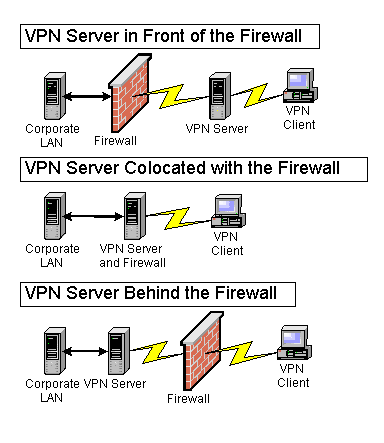VPN Reviews Router Firewall
Evaluation or VPN reviews of VPN technology solutions provided by various vendors describe and compare features such as security and performance. Evaluation criteria adopted in VPN reviews can look at aspects of VPN devices such as
- VPN Routing performance
- Security including tunnelling, encryption and authentication
- Firewall features
- Overall cost
VPN systems can be integrated VPN devices providing routing, encryption and firewall features in a single hardware device. They may also be separate components or may be software based. Dedicated VPN hardware devices show better performance, although experts warn against bundling all security features at a single point.
Evaluation of Security in VPN Reviews
Security is the key feature of VPN solutions. As VPN uses the Internet, which is a very public infrastructure to transmit data, it implements security measures such as encryption and authentication. A company that uses VPN to set up a virtual office communications network would require that others outside the VPN network should not be able to intercept transmitted data.
Security of data communications in office VPN is implemented using authentication and encryption features used by the specific VPN technology. The Internet Protocol Security (IPSec) is a communications protocol, which enables secure data transmission using encryption over public networks. IPSec compliant VPN systems use a tunnelling protocol, where the data and header information is encrypted and sent over the Internet. The receiving system on the specific VPN then decrypts the data to get the actual message.
The aspects relating to security to be evaluated in VPN reviews are:
- Encryption and decryption of data transmitted across the network, so that only users having authorised keys can send and read the actual transmitted data. Data encryption standards should be considered.
- Authentication of sender of data.
- Integrity of data should be guaranteed, that is, hackers should not be able to modify the data.
- Sniffer proof networks where data cannot be intercepted midway during transmission.
VPN reviews can use tools such as ISS Internet Scanner to detect vulnerabilities in the VPN system provided by a specific vendor.
While IPSec-compliant VPN requires client software to be installed, Secure Sockets Layer (SSL) VPN does not require client software for data communication over a VPN network. Just a web browser is enough for a remote user to get connected to an office VPN.
Some sources of SSL VPN reviews are Network world�s review of Microsoft�s Forefront Unified Access Gateway SSL VPN which is a software-based solution, and websites such as firewall.com which has reviews of Sonic Wall VPN products, which are hardware-based. Features to look out for include how many concurrent users can be supported, security and authentication features.
VPN Firewall Reviews
A VPN firewall performs packet-filtering functions by placing restrictions on the type of data that is transmitted over the private network. A firewall can restrict access by allowing data only from authorised sources to be sent across the network.
VPN firewall reviews can also note VPN firewall functions such as perimeter security and efficient detection of intrusion attempts. Network threats such as Denial-of-Service attacks and network information eavesdropping can be detected by VPN firewalls.
The firewall may be built into the VPN device or may be separate.
The VPN reviews of WindowsNetworking.com compare the VPN firewalls and features offered by a range of VPN vendors such as Juniper Networks, Cisco, SonicWall and McAfee. Click here to read VPN Firewall reviews
VPN Routing Features – VPN Router Reviews
Some performance capabilities that can be tested in VPN router reviews are packet forwarding rate and scalability of the VPN network. It is usually seen that pack-forwarding rate slows down with encryption. Networking tools can be used to measure the packet-forwarding rate of encrypted data and if there is any reduction in performance. It is seen in independent VPN reviews that if encryption is implemented in the VPN hardware itself, there is better performance of the device.
The number of simultaneous VPN connections or tunnels that can be supported by a VPN router device indicates its scalability. The needs of a company have to be considered in this case. Some VPN device routers are for small and medium enterprises and may support a lesser number of simultaneous connections as supposed to those VPN routers dedicated to large enterprises.
VPN router reviews must also consider ease of use of the device in aspects such as remote configuring. A VPN router and system difficult to configure and manage may lead to reduced performance of the VPN system.
VPN routers are today comprehensive hardware devices, which combine routing, security features and firewalls into a single product. VPN vendors offer VPN router reviews of their products based on features and functionalities on their websites. For example, information on Cisco Small Business VPN routers can be found on their website as www.cisco.com in the form of datasheets.
Independent VPN reviews can be found at sites such as www.zdnet.com along with price comparisons of products from VPN vendors such as Cisco, D-link and Netgear.
Continue to: Products for Site to Site VPN


